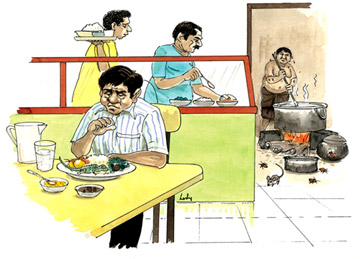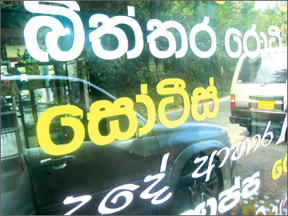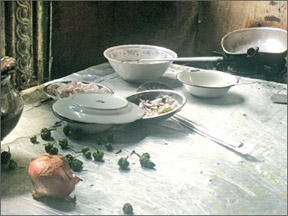|
When lizards are served free of charge:
Unwelcome insect cuisine
Aditha Dissanayake
Yes. You have heard this joke already. Not once but a million times.
There was this man in a restaurant and he said to the waiter, “What’s
this fly doing in my soup?” And the waiter replied, “Don’t worry sir,
there is no extra charge.” But what happens when the fly is not a fly,
but a lizard and the soup happens to be, not soup but parippu? And the
joke is not a joke, but a real life incident? What did the waiter say
when he saw the lizard? Nothing. Because the customer did not call the
waiter. Instead, he made his way from Richmond Hill to the Galle
Municipal Council and tipped two Public Health Officers who raided the
hotel, and took the proprietor to court where he was fined Rs 6,000.
 “The sentence was too light,” says Ravi Masakorala, Hotelier with
over twenty years experience in the hotel industry who believes
negligence and ignorance when preparing food for customers are
unpardonable crimes. “Every institute that serves food should maintain
strict hygienic standards. Chefs are like doctors and kitchens should be
as clean and sterile as operating theatres.” “The sentence was too light,” says Ravi Masakorala, Hotelier with
over twenty years experience in the hotel industry who believes
negligence and ignorance when preparing food for customers are
unpardonable crimes. “Every institute that serves food should maintain
strict hygienic standards. Chefs are like doctors and kitchens should be
as clean and sterile as operating theatres.”
So, if you belong to the ignorance-is-bliss camp, when it comes to
restaurant dining, you may stop reading now - what follows might well be
stomach churning. For, according to Masakorala, regardless of how plush
and inviting the restaurant in which you choose to eat may appear, the
reality is that you are extremely unlikely to see the kitchen or have
any knowledge of what goes on behind those ‘staff only’ doors. If you do
get the chance to catch a glimpse you might notice the hygiene - or
rather the lack of it - behind the kitchen doors can take several forms.
It can take the form of the kitchen not being cleaned properly and
dirt, mouse droppings or simple stale and congealed food found in
abundance. It could mean unclean prep surfaces, which can allow for
dangerous cross-contamination between, say, raw meat and fruit. It can
take the form of food not being stored properly or under the wrong
temperatures which could lead to bacteria infesting. Or it could be that
the staff does not observe personal hygiene procedures like washing
their hands as often as required putting diners at risk for contagion of
norovirus or salmonella.
Over to the authorities: the ones who have drawn standards, set the
bar,kept the stable doors shut. Deputy Director General, Sri Lanka
Standards Institution (SLSI) Dr Priyadarshini Talgaswatte, says when it
comes to food safety the institute maintains a ‘proactive approach’.
 |
|
What’s in a
name if it tastes the same? |
Believing in detection is better than prevention the SLSI issues
certificates to institutes engaged in the food industry that adhere to
food safety standards which range from the basic standards set for small
or micro level enterprises called Good Manufacturing Practice (GMP) to
Hazard Analysis and Critical Control Points (HACCP), to ISO 22000. “When
the SLSI issues a certificate to a hotel or a restaurant it means that
the institute in question maintains a system that controls the chemical,
physical and biological hazards encountered during the production
processes of the food item, to make the food safe for human
consumption,” explains Dr Talgaswatte.
Food safety standards that should be met by most hotels include not
keeping the buffet open for more than four hours, maintaining a
temperature of 80C when cooking, and once finished not exposing the food
to the ‘danger zone’ i.e 5C to 63C, using hot holding dishes and chafing
dishes to keep the food on the buffet table hot and making sure the
staff is suitably attired while handling the food. “The staff should
wear masks, gloves, have their heads covered and should not wear rings
or gem studded pendants while they are at work.”
“Not bad” is the verdict Dr Pradeep Kariyawasam, Chief Medical
Officer of the Colombo Municipal Council, gives when asked to comment on
the current situation of the hotels, restaurants and fast food outlets
in Colombo.
“Compared to how things were ten years ago, things have vastly
improved,” says Dr Kariyawasam.
“When he had assumed office ten years ago he had noticed there was
almost no difference between the kitchens of the Bath kades and those in
five star hotels with regard to hygiene standards.
 |
|
The
morning after: a roadside kottu stand. |
“Some hotels did not even have basic washing facilities like soap in
their kitchens. But things have gradually improved now and with the
ownership of some hotels changing hands, 15 to 45 million has been spent
on improving the kitchens.”
As a result Dr Kariyawasam says out of around 750 eating houses in
the city 150 are perfectly safe for dining, while three hundred have
received A or B grades given by the CMC.
This year he plans to issue plaques to food outlets that meet the
food safety requirements of the CMC so that the customers will know if
they are in safe hands when it comes to having a meal in a restaurant or
hotel or a simple ‘Bath kade’ in Colombo.
Sighs of relief.
Especially when you get to know even those who clamour for impeccable
standards like Masakorala, still dines out.
“You have got to eat,” he says. “It’s exciting to take chances, and
look for the obvious signs - like flies or the colour of the cloth the
waiter uses to wipe the table top. Still, no worries. We Sri Lankans
have a very strong immunity system.”
[email protected]
|



